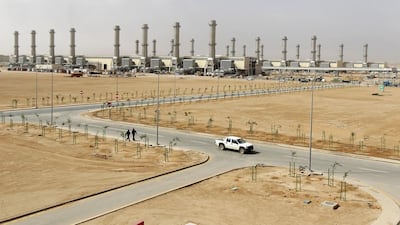Saudi Arabia is targeting 40 gigawatt hours of energy savings this year, according to the head of the country’s newly established National Energy Services Company (National Esco), as part of the country’s economic diversity and environmental sustainability objectives.
The energy efficiency body, officially launched by sovereign wealth fund the Public Investment Fund (PIF) in October, is seeking collaboration with foreign partners to achieve the target, its chief executive Waled Al Ghreri told The National during a panel discussion at the Abu Dhabi Sustainability Week.
“We estimate that taking everything into consideration, the collected savings of this year will be around up to 40 GWh,” he said.
“We started six or seven months ago and we have 10 RFPs [request for proposals] in the pipeline, so and here we’re talking about a combination of buildings very visible buildings. We’re putting together a set of projects that will not only attract escos [energy efficiency companies] but also have the clients - government entities - to adopt these projects.”
Saudi Arabia, the world’s largest exporter of oil consumes three times more energy per capita than the world average, according to the United Nations Development Programme, using up 6.5 tonnes of oil equivalent (toe) per capita in 2011, compared with the global average of 1.9 toe.
National Esco, which was launched with a capitalisation of 1.9 billion riyals (Dh1.86bn), has been given responsibility for energy efficiency measures at schools, mosques, and all public buildings occupying 30,000 square metres or more of floor space. All government entities are obliged to work with the body to implement energy efficiency measures.
_____________
Read more:
Saudi Arabia’s PIF to save oil with new energy services company
Region’s first sustainability-focused startup accelerator launched in Abu Dhabi
US Department of Energy shows interest in Dewa projects
_____________
The body is currently paying for most of the energy efficiency projects it is sponsoring, in order to stimulate interest, said Mr Al Ghreri.
“That was the only way to get the market to move quickly,” he said.
The body is working with PIF to open up the nascent energy efficiency sector to investment opportunities by setting up special purpose vehicles for private equity investors.
“The expected returns of these projects is between 10 to 12 per cent and with some leverage becomes very attractive. We’ll be announcing soon in terms of size and capital for these projects,” he said.
Saudi Arabia, a late convert to both renewable energy and energy efficiency measures, has been seeking to make up for lost time, with both areas featuring heavily in the country’s Vision 2030 economic transformation programme.
The kingdom’s Renewable Energy Project Development Office announced last week that it was looking to tender 4GW of wind and solar projects in 2018 as it looks to deploy around 9.5GW of renewable capacity by 2023.
The onset of value added tax and power tariff increases from the start of the year has also put pressure on both public and private sector entities to begin implementing energy efficiency measures, said Mr Al Ghreri.
“We’re getting asked daily on what can we do, how can we save? Who should we talk to? So that puts a lot of pressure on us to really develop the industry here,” he said.


